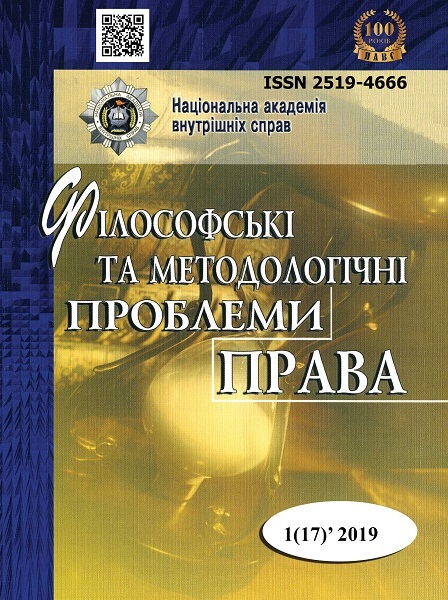Anthropology of Law as a Component of Philosophical Anthropology (General Essay)
Abstract
The purpose of the article is to attract the attention of modern specialists on the philosophy of law the achievements of the Ukrainian school of 60-ies of the last century in the field of general philosophy and philosophical anthropology, as well as to show that a number of provisions of anthropology of law are a composites of the relevant provisions of philosophical anthropology, and that the dialectical relationship of legal anthropology with legal praxeology, axiology, ontology and gnoseology are conditioned to the dialectical interrelations of philosophical anthropology with philosophical praxeology, axiology, ontology and gnoseology. It should be noted that Vladimir Kuzmenko in his article «Оnthology, anthropology, axiology, gnoseology of Thomas Aquinas law conception» considers the question of syncretism, that is, the indissoluble unity of the legal ontology, anthropology, axiology and epistemology in connection with a philosophical-legal concept of this thinker, but only with respect to this concept, the question should be put more widely. Methodology. Research methods due to the nature of the issue. The article used primarily dialectical and systemic-structural methods of logic. The scientific novelty of the article is to attract the attention of modern specialists on the philosophy of law to the achievements of the Ukrainian school of 1960-ies because they can and should be extended to the philosophy of law and legal anthropology in particular. Organic interconnection of anthropology with other major sections of the philosophy of law due to the presence of the organic interrelations of philosophical anthropology with appropriate disciplines. Conclusions. Specialists in philosophy of law must deeper explore the heritage of Ukrainian philosophers of the sixties and the dialectics of legal anthropology, praxeology, axiology, ontology and gnosiology.
Keywords: anthropology of law; philosophical anthropology; philosophy of law; legal man; dialectics.
Downloads
References
Бандура О. О. Антропологія права як складова філософії права. Філософські та методологічні проблеми права. 2017. № 1 (13). С. 102–111. URL: https://philosophy.naiau.kiev.ua/index.php/philosophy/article/view/354.
Comaroff J. Does Anthropology Matter to Law? Journal of Legal Anthropology. 2018. Vol. 2. Issue 2. P. 72–78. doi: https://doi.org/10.3167/jla.2018.020206.
Engle M. S. Does Law Matter to Anthropology? Journal of Legal Anthropology. 2018. Vol. 2. Issue 2. P. 86–91. doi: https://doi.org/10.3167/jla.2018.020208.
Gardner D. Comment on cosmopolitan politesse. Journal of Legal Anthropology. 2019. Vol. 3. Issue 1. P. 85–93. doi: https://doi.org/10.3167/jla.2019.030106.
Hughes G. Introduction. Journal of Legal Anthropology. 2019. Vol. 3. Issue 1. P. 83–84. doi: https://doi.org/10.3167/jla.2019.030105.
Иванов В. П. Человеческая деятельность – познание – искусство. Киев : Наук. думка, 1977. 251 с.
Kingsley J., Telle K. Does Anthropology Matter to Law? Journal of Legal Anthropology. 2018. Vol. 2. Issue 2. P. 61–71. doi: https://doi.org/10.3167/jla.2018.020205.
Koch I. Turning Human Beings into Lawyers. Journal of Legal Anthropology. 2018. Vol. 2. Issue 2. P. 99–104. doi: https://doi.org/10.3167/jla.2018.020210.
Кузьменко В. В. Онтологія, антропологія, аксіологія, гносеологія філософсько-правової концепції Фоми Аквінського. Науковий вісник Дніпропетровського державного університету внутрішніх справ. 2018. № 4. P. 11–19. doi: 10.31733/2078-3566-2018-6-11-19.
Paaras A., Goudsmit A. Book Reviews. Journal of Legal Anthropology. 2019. Vol. 3. Issue 1. P. 103–108 doi: https://doi.org/10.3167/jla.2019.030108.
Peletz M. G. Why Anthropology Doesn’t Matter Much to Law. Journal of Legal Anthropology. 2018. Vol. 2. Issue 2. P. 92–98. doi: https://doi.org/10.3167/jla.2018.020209.
Rapport N. The grey zone, distortion and the ownership of causation. Journal of Legal Anthropology. 2019. Vol. 3. Issue 1. P. 94–102. doi: https://doi.org/10.3167/jla.2019.030107.
Rosen L. Reconciling Anthropology and Law. Journal of Legal Anthropology. 2018. Vol. 2. Issue 2. P. 105–108. doi: https://doi.org/10.3167/jla.2018.020211.
Шинкарук В. И., Яценко А. И. Гуманизм диалектико-материалистического мировоззрения. Киев : Политиздат Украины, 1984. 255 с.
Человек и мир человека (Категории «человек» и «мир» в системе научного мировоззрения) : монография / [В. И. Шинкарук, В. П. Иванов, И. Н. Молчанов и др.] ; ред. В. И. Шинкарук. Киев : Наук. думка, 1977. 344 c.
Жизнь как творчество / [В. И. Шинкарук, Л. В. Сохань, Н. А. Шульга и др.]. Киев : Наук. думка, 1985. 298 с.
Uzel K. Book Review. Journal of Legal Anthropology. 2018. Vol. 2. Issue 2. P. 122–124. doi: https://doi.org/10.3167/jla.2018.020214.
Wilson R. A. The digital ethnography of law. Journal of Legal Anthropology. 2019. Vol. 3. Issue 1. P. 1–20. doi: https://doi.org/10.3167/jla.2019.030101.
Abstract views: 635 PDF Downloads: 566
Copyright (c) 2020 Philosophical and Methodological Problems of Law

This work is licensed under a Creative Commons Attribution-NonCommercial-NoDerivatives 4.0 International License.
- Authors reserve the right to authorship of their own work and transfer to the magazine the right of the first publication of this work under the terms of the Creative Commons Attribution License, which allows other persons to freely distribute published work with mandatory reference to authors of the original work and the first publication of an article in this magazine.
- Authors have the right to enter into separate additional agreements on non-exclusive dissemination of the work in the form in which it was published in the journal (for example, to post an article in the institution's repository or to publish as part of a monograph), provided that the link to the first publication of the work in this journal is maintained.
- The journal's policy allows and encourages the posting of articles by authors on the Internet (for example, in electronic storehouses of institutions or on personal websites), both before the submission of this manuscript to the editorial office and during its editorial processing, as this contributes to the creation of a productive scientific discussion and positively affects the efficiency and dynamics of citing the published work.




